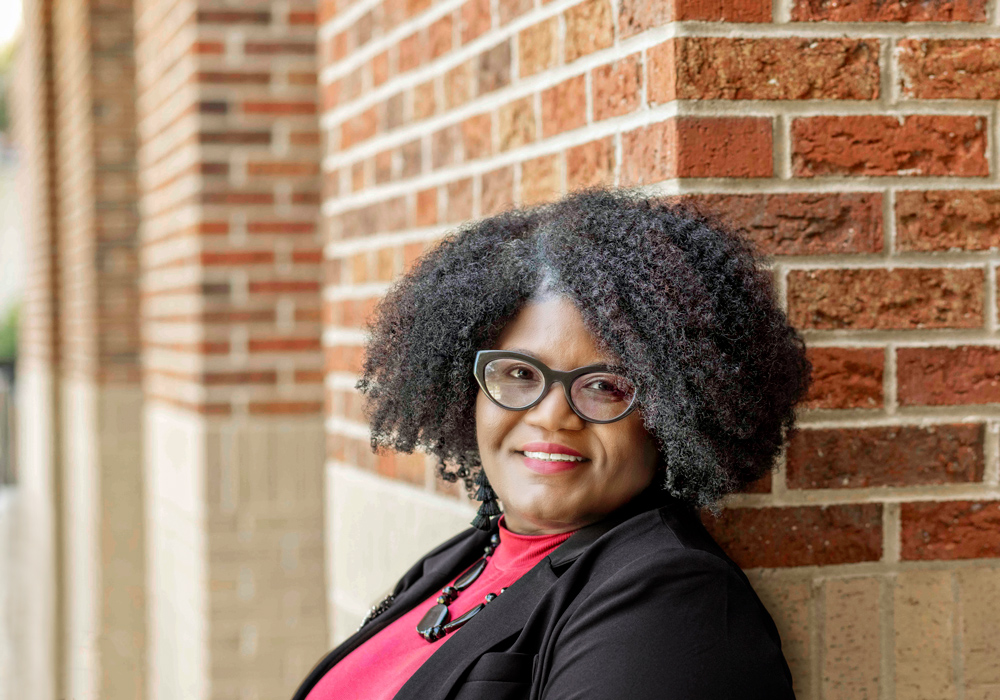Nikki Wooten was a soldier before she was a scholar — a fact that helps drive and inform her research dedicated to helping American’s military members and veterans access the resources they need for better mental health.
An associate professor in the College of Social Work since 2013, Wooten has combined her passion for improving mental health with serving her country. She retired from military service in 2022 after nearly 34 years in the Army Reserves and Army National Guard. She teaches military social work and psychopathology graduate courses. She also conducts research on behavioral health services in military and veteran populations and has a research appointment at the William Jennings Bryan Dorn Veterans Administration Medical Center in Columbia.
She began her military career based on advice from her father, who did not serve in the military, but recommended a career in the Army Reserves in addition to going to college. It was advice that she and her brother, who served two tours of duty in Afghanistan, followed as well as several aunts and uncles.
“He said those 20 years would fly by. And he was right. And I'm glad I listened,” Wooten says. “Both my brother I were obedient, so to speak. We are a military family.”
While working on a bachelor’s degree in administration of justice with a minor in women's studies at the University of North Carolina with a plan of going to law school, Wooten met a professor who would help define her career goals.
“I did an independent study in women's studies with Audrey Johnson, who was a professor in the UNC School of Social Work,” she says. “The final assignment was a paper. I don't remember the topic, but I can definitely credit her for my strong writing skills today and how to think more critically.
“She really made an impression on me as someone who set high standards for me as a writer and as a social worker.”
Wooten decided that instead of becoming a lawyer and meeting people after their lives had gone off the rails, she would rather be part of an earlier intervention.
“It made me realize that, typically in underserved communities, by the time they seek out an attorney, it's almost too late for them,” Wooten says. “I felt that I can intervene in communities like that earlier as a social worker and be in a more pivotal and preventive role as a social worker.”
From there, Wooten went to Howard University to pursue her master’s in social work. While in the nation’s capital, she joined the D.C. National Guard.
“My military community is here and it's also my research area. That's very, very important to me. And I feel as a university, they understand my research.”
“I was getting my master's. I was in the reserves. I went to Officer Candidate School. And I had a part-time job,” Wooten says.
She decided to take a break from school after earning her MSW and focus on getting field experience as a social worker.
“At that point, I was kind of exhausted with school and I wanted to have some practice experience before I went into the classroom to teach as an academic,” she says, adding that practice experience is also a requirement to be a clinical professor. “So I went to work for Child Protective Services. And one thing I learned about working in Child Protective Services, you really hone your assessment skills as a social worker.”
So her focus on her civilian career, which was supposed to last just two years, turned into 10 years.
“I was focusing on my civilian career or I was focusing on my military career,” she says. “So I got my master's degree, then I got commissioned as a second lieutenant two years later. Then I got a lot of social work experience for 10 years. Then I worked for the Armed Forces Center for Child Protection. Then I went to the University of Maryland to begin working on my Ph.D.”
Still, there was overlap. While she was earning her Ph.D., she was on active duty in the D.C. National Guard, working for the commanding general who reported directly to the Secretary of the Army and Defense Secretary Donald Rumsfeld.
“So that was an interesting bird's eye view of the world,” she says.
After completing her Ph.D., she taught at Boston University for three years before leaving the cold weather behind and coming to USC.
Wooten says being at USC allows her to live close to family members who are in the Columbia area as well as a strong military community.
“My military community is here and it's also my research area,” she says. “That's very, very important to me. And I feel as a university, they understand my research.”
Her recent projects explore substance use and psychological problems in military personnel and veterans; differences among servicemen and servicewomen seeking behavioral health services; and the general mental health of service members after deployment.
“There's never a time when I have to explain to people in the community or in the university community why my research is important.”
